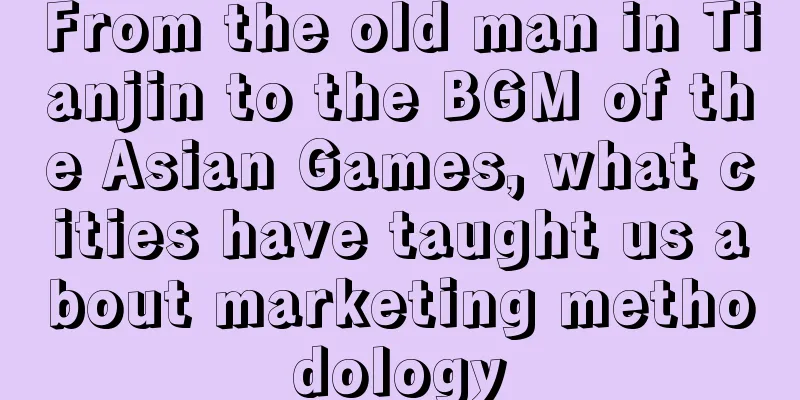From the old man in Tianjin to the BGM of the Asian Games, what cities have taught us about marketing methodology

During the past eight-day holiday, 826 million tourists contributed 753.43 billion yuan in tourism revenue, and the battle for tourists between cities has come to an end. Given the popularity of the tourism industry this year, it can be said that whoever attracts more tourists has mastered the code to wealth. Since Zibo became popular with its barbecue, it has become a model for other cities to learn from. Everyone wants to learn a few lessons from Zibo's path to fame, to contribute to their own development and construction, and to make up for what they lost in the past three years. Which cities have taken advantage of this overwhelming wealth? WeChat data shows that consumption in more than 20 cities doubled during the two-day festival period, with Chongqing, Chengdu, Suzhou and Wuhan being the most popular. On social media, Hangzhou, which hosted the Asian Games, is a well-deserved top spot. City marketing and brand marketing have many similarities. The Knife Skills Research Institute once conducted an in-depth analysis of the traffic code of Zibo barbecue. In just half a year, the small city of Rongjiang in Guizhou and Tianjin became new Internet celebrities with their village super and diving uncle. The old Internet celebrity cities of Chengdu, Chongqing and Xi'an also spared no effort to introduce new ideas and attract tourists in various ways. This wave of niche cities that have become popular are like new brands that have gone from 0 to 1, finding differentiated advantages under the condition of limited resource endowment. Old Internet celebrity cities are facing the same transformation dilemma as mature brands, and they have also found ways to break through. What can brands learn from Internet celebrity cities? The Knife Method Research Institute has sorted out the "explosive methodologies" of new and old Internet celebrity cities in the past six months, hoping to inspire you. 1. A rising star, jumping back and forth between "going viral" and "making a fool of oneself"Throughout the holiday, Hangzhou can be said to be "living on the hot search." In order to leave a good impression on tourists from all over the world during the Asian Games, all the handsome policemen in Zhejiang were invited to their home, and it became the city with the highest density of "husbands" in the country. "Fengshen" made the Proton Group popular, and at the Hangzhou Asian Games, there were walking "double doors" everywhere. This "male sex marketing" was played better than many brands. However, Hangzhou’s popularity is not only due to its appearance, but also due to its connotation. If a brand can play with memes, it is not far from young people. In this regard, the BGM of the Hangzhou Asian Games is as good as the six princesses of CCTV. In the words of netizens, "No song is played in vain"—— "A Thousand Years of Waiting" was played before the swimming competition, an adapted version of "Do You Want to Dance" was played on the 10-meter diving platform, and during the halftime break of the men's basketball game, the music "See You Again" sounded, and all fans paid tribute to basketball superstar Kobe. According to the organizers of the Hangzhou Asian Games, there are many people born in the 2000s in the team behind the scenes. The rejuvenation of the organization has made the Asian Games no longer high and mighty, but a real event for young people. The city of Hangzhou has also been labeled as "understanding young people". If Hangzhou taught brands how to resonate with young people, then what is worth learning from Tianjin and Guizhou is how to adapt to local conditions and find differentiated advantages. Similar to Zibo, Tianjin and Guizhou have accurately grasped the public sentiment and shaped the lifestyle that locals are accustomed to into the "spiritual yearning" of outsiders. Take Tianjin for example. It became popular when young people were enthusiastically following City Walk. From Beijing, Shanghai, Guangzhou and Shenzhen to third- and fourth-tier cities, City Walk has become a must-do for travel. As a lifestyle, City Walk encourages people to measure the city with their feet and understand the history and culture behind the buildings and streets. Although it has developed into a trend of "group walking" during its popularity, this activity that combines outdoor sports and social interaction is still loved by many young people. But in Tianjin, the old men who jumped off the Lion Bridge gave the young people a good lesson. You are "old if you don't go crazy", we are old but still crazy, you City Walk, we City Jump. The old man who jumped off the bridge was not jumping into the water, but people's inner yearning for freedom. Compared with old internet celebrities like Chengdu and Changsha, this generation of new internet celebrity cities are all different. However, it is a good thing to find differentiated competitive advantages. What is more important is to lay a good foundation for urban construction and to receive traffic. After all, there is often only one step between being popular and being embarrassing. Shortly after Tianjin became popular, the uncles of the Lion Grove Bridge Diving Team suddenly issued a farewell letter. City Jump attracted many followers, but also buried safety risks. The city was not well prepared to deal with emergencies and finally chose a "one-size-fits-all" approach. Without the uncles, Tianjin has returned to its former tranquility. Tourists may forget about this city soon, but the uncles in Tianjin have lost a kind of fun in life. What's more, the Henan city of Nanyang held the "2023 Zhongyuan Midi Music Festival" during the holiday. It was originally intended to take this opportunity to boost local consumption, but it became a hot topic because of the theft incident. It is still unknown how much economic benefits the music festival will bring to the local area, but the city's reputation has actually declined. There is no need to escalate the theft incident into regional discrimination, but Nanyang also used its own experience to warn other cities that want to go viral through music festivals and concerts that traffic is a double-edged sword. It can bring revenue, but it will also expose a city's shortcomings. 2. Veteran influencers, rebornThe up-and-coming cities are still exploring and advancing by trial and error, while the established internet celebrity cities are racking their brains to come up with new ideas. Seeing giant pandas has always been a must-do activity in Chengdu, but I have never heard that you need to get up at 4 a.m. to queue up to see giant pandas. The reason why the Giant Panda Base has become a popular check-in spot is inseparable from the official "star-making campaign". The Giant Panda Base has opened a WeChat public account to regularly update the daily life of the giant pandas in the park. Through secondary dissemination on platforms such as Douyin and Xiaohongshu, the giant pandas have attracted many followers. "Female Star Huahua" is one of the most successful operations. The star effect is effective everywhere, and the panda world is no exception. In order to see Huahua, people are willing to queue for 2 hours and watch for 5 minutes. The new Sanxingdui Museum, which just opened, has also attracted many tourists to Chengdu. Since its opening at the end of July, it has been crowded almost every day. Although the new museum is located in Guanghan City, Chengdu did not miss this opportunity and opened a direct bus from the city center to the museum. Tourists can take the bus at Chunxi Road, Kuanzhai Alley and other stations, and the ticket price is only 20 yuan. The secret of Chengdu's long-term success is to continuously tap into new traffic codes from its own resources and continuously optimize the experience through infrastructure construction and service capacity improvement. This is also the basic logic of many mature brands' transformation. In addition to Chengdu, cities such as Xi'an and Shanghai are also constantly introducing new ways to play at familiar tourist attractions, making themselves permanent guests on the list of Internet celebrity cities. From the "Tumbler Sister" in the Tang Dynasty City That Never Sleeps, to the creative surroundings of the Terracotta Warriors, to the light show on the ancient city wall, Xi'an has made full use of its historical and cultural resources, combined with modern technology and precise insights into users, to bring new ideas to traditional tourist attractions. The Bund, the most popular tourist attraction in Shanghai, has also been given a new romantic label because of the "light-up moment". Watching the sunset at the Pudong Art Museum and taking photos with the three-piece set of Lujiazui have become new activities for Shanghai tourism. 3. How to convert traffic into development momentum?By combing through the paths of new and old Internet celebrity cities, we can easily see three basic conditions: first, clear positioning, second, systematic communication, and third, obvious differentiation advantages. If we further study those long-lasting cities, we will find that the level of urban governance and infrastructure construction are the real password for traffic. After a city becomes popular, the test of its management ability has just begun. It is easy to become an Internet celebrity city, but the difficult part is to turn Internet celebrities into a driving force for urban development. This is like a brand creating a hit product. If it lacks the basic skills of supply chain and channels, it will only be a flash in the pan. Take Zibo as an example. When it became popular, it stabilized prices and the people of the city took action together to ensure the experience of tourists. After the traffic subsided, the accumulated reputation did not disappear. The strong psychological imprint makes Zibo no longer a city without a sense of existence. In the future, when people mention Shandong, they will think of Zibo barbecue and the enthusiasm of the locals. After returning to normal, Zibo seems deserted, but substantial changes have taken place inside. According to the data from the Zibo Municipal Bureau of Statistics, the total retail sales of consumer goods in the city reached 63.94 billion yuan in the first half of the year, a year-on-year increase of 9.7%, 1.4 percentage points higher than the first quarter, and 1.5 and 0.6 percentage points faster than the national and provincial levels, respectively. Zibo's service industry continued to recover, with the added value of accommodation and catering industry and profitable service industry increasing by 9.9% and 12.9% respectively. The added value of the city's modern service industry increased by 7%, 2 percentage points faster than the growth rate of all service industries, and its contribution to economic growth reached 35.1%. Whether it is for the city or individuals, long-term non-stop operation is an unhealthy state. Under the impact of traffic, Zibo's barbecue restaurants and service industries seem to be making a lot of money, but in reality they are like a tight string that may break at any time. Zibo's greatest wisdom lies in being able to stay sober in the face of huge interests, constantly optimizing products and services, and reaping long-term benefits. Similarly, Hangzhou invested a lot of resources to optimize the city's infrastructure during the Asian Games, not only to provide convenience to tourists in the short term. Rechargeable public seats and carefully designed green landscapes will become benefits that people can enjoy every day after the Asian Games. More importantly, Hangzhou has improved the construction standards of urban public facilities. The good reputation brought by the comfortable experience has not only improved its own city image, but also promoted the development of other cities. Whether it is Zibo or Hangzhou, they both give tourists reasons to come again. And the phrase "come again next time" is the best compliment to a city. Author: Jingmin WeChat public account: Knife Skills Research Institute (ID: DigipontClub) |
<<: Single product account, money everywhere!
>>: Why do strategists need quadrant thinking?
Recommend
Losing millions of fans overnight, what minefields did the internet celebrities step on as they were hit hard by the backlash of traffic?
Traffic is the key to success and traffic is the k...
How to use influencers to expand your business across the globe?
This article describes how brands can maximize the...
The "huge wealth" of bees and flowers cannot be achieved by relying solely on free traffic
As the Li Jiaqi incident continued to ferment, tra...
OpenAI is doing something mysterious, GPT-4.5 is quietly launched? Netizens are shocked by its reasoning that crushes GPT-4, while Ultraman smiles without saying a word
Just last night, the entire AI community was shock...
Is the data fluctuating again? Five steps to accurately identify abnormal data fluctuations
Monitoring data and analyzing abnormal data are co...
Can shein sell the same product? How does shein list products?
Shein is loved by consumers for its rich variety o...
How to solve the problem of Amazon's store closure? What are the methods?
Once a related situation occurs on Amazon, if ever...
What should a new Amazon seller do? Operational strategies and suggestions
In the modern e-commerce market, Amazon has become...
What is the Amazon One-Click Listing Global Function? Detailed Introduction
If you are a merchant on Amazon, you must know wha...
299 yuan per set, 24 hours a day, AI anchor enters the live broadcast room
Have you ever had this experience: when you open a...
Does Shopee in Thailand need to pay VAT? What are the requirements for joining Shopee?
In our country, whether you open a store on an e-c...
How long does it take for something to arrive on Amazon Japan? How long does it usually take to ship?
When buying things online, what people are most co...
"Copying" Brother Yang, a crazy business
Why can we always watch the live clips of big anch...
This is the best user growth analysis model I have ever seen
When conducting data-driven growth analysis, data ...
Detailed explanation of the operating costs of the three e-commerce giants: Where does the pressure on merchants come from?
When merchants complain about "only refunds&q...









